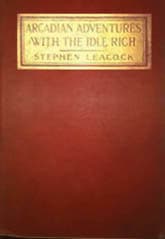Arcadian Adventures with the Idle Rich
 First edition
First editionFirst publication
1914
Literary form
Story collection
Genres
Satire, humour
Writing language
English
Author's country
Canada
Length
Eight storiess, approx. 65,000 words
The rich are not as funny as you and I
Stephen Leacock's Arcadian Adventures with the Idle Rich hardly ever gets discussed without being compared to Sunshine Sketches of a Little Town. The two are seen as companion pieces, Sunshine Sketches being his vastly popular take on small-town life and Arcadian Adventures the followup that turns the same satiric eye on big-city life.
For a while, Arcadian Adventures was considered a bigger success, a hit throughout North America. Today it is still considered one of Leacock's greatest works by some critics, but in general it has paled next to Sunshine Sketches, which has endured as the Leacock classic.
It's easy to see why. Arcadian Adventures somehow seems less authentic, more artificial in its characters and setting, than the earlier work. This is not only because it concerns a metropolis. It is also pointedly situated in an American metropolis, although one suspects Leacock is drawing on his experiences in Montreal and Toronto for most of it. Sunshine Sketches has been called the most Canadian book ever written, but despite its provincial Ontario setting it still strikes universal chords. The worlds of finance, universities and inner-city churches in Arcadian Adventures are too obviously those worlds as they were in 1914 North America.
The satire may have hit a nerve in those early twentieth-century years, but we are now very aware of how much the urban targets of that humour have changed since then.
To give an overall picture of the society, Leacock uses—as he did in Sunshine Sketches—one troupe of characters who parade in and out of the overlapping stories. In the sunny world of Mariposa this is credible, since you'd expect to find there a small population in which everyone knows everyone else. But in New York or Chicago, or whatever city where Arcadian Adventures is supposed to be taking place, this is not credible.
Moreover, Leacock keeps trying to impose on his characters the naive, bumpkin mentality that worked so well in Mariposa. It rubs against the heavier financial and political scamming he has his characters engaging in. Note, even the title ("Arcadian") tries to lend a folksy, pastoral quality to the tale. And, is it just me, or does it seem that Leacock imports a British uppercrust attitude to beef up the characters? The biggest twits don't appear particularly like the red-blooded, go-get-'em, all-Americans that are more often parodied today. Or have Americans changed that much since then?
Perhaps the worst that can be said about Arcadian Adventures with the Idle Rich though is that it is just not as funny as that other book. It's not written as brilliantly. The characters are not so cleverly drawn, the narrator plays a more confusing role and the situations are not as engaging. We can't identify with the people or situations as much.
However, we can find much to admire in it. The satire is quite a bit sharper, the targets are more serious, the people a nastier lot. When Leacock ridicules the class prejudices of the rich, their self-interested machinations, their hypocrisy and so on, his attack is closer to that of Mark Twain. Leacock is supposed to have been a conservative—a reactionary by today's standards—but it didn't hold him back from slamming satirically the class he was supposed to have favoured politically.
It's just too bad that in the end his innate gentleness keeps him from giving them a real comeuppance in this book—we'd been glad to see everything work out for the well-intentioned, if deluded, Mariposans, but not so much for the wicked, deluding rulers of Metropolis.
My favourite story here is "The Yahi-Bahi Oriental Society of Mrs. Rasselyer-Brown", in which the high-society matrons and their husbands get taken for fools by con artists whom any reader could see through.
I also love the names. Dickensian (there's that British influence again) with a Marx Brothers twist: Reverend Uttermust Dumfarthing, the hapless twit Peter Spillikins, Alderman O'Hooligan, the Duke of Dulham, and the sex-poet Sikleigh Snoop, to list a few. But of course funny naming is one of the stocks in trade that Leacock employs in his more nonsensical collections of parodies.
Perhaps it's best to read Arcadian Adventures with the Idle Rich in this light—as a hard-hitting, if somewhat silly, satire in its own right, rather than in conjunction with the earlier eternal classic.
— Eric

